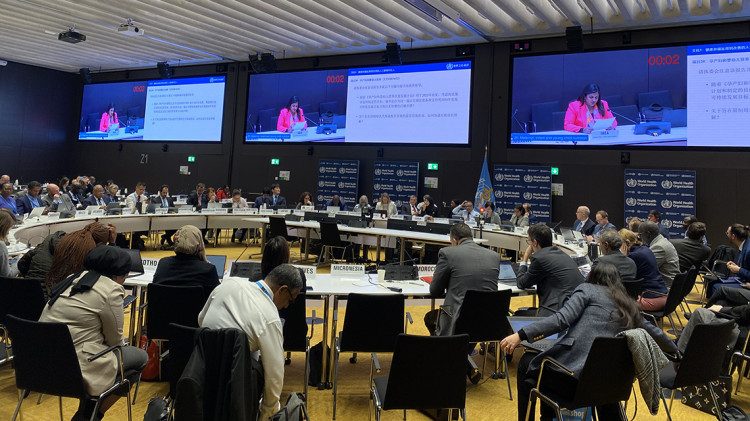The IAEA is actively assisting low- and middle- income countries to increase access to cancer care as well as supporting other peaceful applications of nuclear science and technology in key health areas, the 154th Executive Board of the World Health Organization (WHO) heard as Meena Singelee, Head of the IAEA Liaison Office in Geneva, delivered the IAEA's statement. Over the past year, the IAEA worked closely with the Food and Agriculture Organization (FAO) and other partners to study antimicrobial resistance; used nuclear techniques to combat malnutrition; and supported Ukraine in a health emergency, the WHO board heard. The longstanding and close partnership between the IAEA and the WHO was also highlighted in the IAEA's statement to the board in Geneva.
High-level delegates from ministries of health across the globe were informed of the progress made in providing assistance on cancer care to countries under the IAEA's Rays of Hope initiative, set up in 2022 by IAEA Director General Rafael Mariano Grossi to widen access to diagnostic imaging and radiotherapy in countries where the need is greatest. In 2023, the IAEA initiative has delivered tangible results - from procuring specialized radiotherapy and medical imaging equipment to facilitating the training of 80 medical professionals and establishing the first Rays of Hope Anchor Centres in Africa, Asia and Europe. The Anchor Centres will support the cancer care capacities of neighbouring countries and create opportunities for regional, subregional and integrational advancement.
The high-level delegates were also updated on the strong collaboration between the IAEA, the WHO and the International Agency for Research on Cancer (IARC). Ten cancer control assessments, known as imPACT Reviews, were coordinated by the IAEA in 2023 and conducted jointly with the IAEA, the WHO and the IARC to assist countries with their national cancer control plans.
Cancer care assistance to Ukraine during the conflict
The IAEA is also helping to provide safe cancer care in Ukraine during the current conflict, which has led to a challenging health emergency. "In response to the Ukrainian authorities' requests for assistance to resolve current challenges in providing safe cancer care, the IAEA is supporting Ukraine through its Rays of Hope initiative," Singelee, delivering the IAEA statement, explained. A key component of this support is the planned provision and funding of radiotherapy equipment for the Bukovinian Clinical Oncology Center in Chernivtsi, Ukraine, along with human resource capacity building.

Meena Singelee, Head of the IAEA Liaison Office in Geneva, delivering the IAEA's statement to the WHO board.
The IAEA highlighted its medical assistance programme aimed at enabling operators and other personnel at Ukrainian nuclear power plants to have access to physical and mental health services, and for periodic assessments to take place to monitor their fitness for duty. The programme also provides support to ensure that the responsible medical facilities have the required capability to provide those services and critical medical support and care when needed.
Collaborations with FAO on antimicrobial resistance
The IAEA is working closely with the FAO and other partners on antimicrobial resistance (AMR). In 2023, the IAEA is working on a five-year project on innovative nuclear and related molecular approaches for detection and characterization of AMR in animal production environments through its Joint FAO/IAEA Centre.
The IAEA statement highlighted the close collaboration between the IAEA and FAO on research and development relevant to AMR in relation to food safety. The IAEA and FAO published a technical paper on the role for nuclear techniques in antimicrobial movement from agricultural areas to the environment. The current work addresses WHO strategic and operational priorities to address bacterial infections in the human health sector between 2025-2035.
Research on nutrition
The IAEA is supporting countries in combatting malnutrition. Nuclear and stable isotope techniques generate accurate data that provide evidence for improving nutrition interventions and programmes. "Through these techniques, many Member States have the capacity to assess body composition, breastfeeding practices, micronutrient absorption from foods, the link between acute malnutrition and later diseases, and to understand the evolution of childhood obesity," the IAEA statement said.
For example, the first international body composition reference charts for infants were published based on an IAEA supported study. These reference body composition charts provide clinicians and researchers with a tool to interpret infant body composition data. These can inform and evaluate interventions to combat malnutrition and set up healthier childhood trajectories. The charts will support the design of nutrition interventions based on more accurate, informative and relevant data. It can also contribute to enhancing nutrition programmes and strengthen global efforts to prevent malnutrition in infants and young children and related longer term poor health into adulthood.
The IAEA's statements to the WHO's Executive Board inform their common Member States about the work of the IAEA and highlight the importance of working closely with longstanding partners such as WHO, FAO, IARC and others to effectively assist Member States. The Executive Board is the governing body of the WHO and is responsible for setting the agenda of the annual World Health Assembly.






